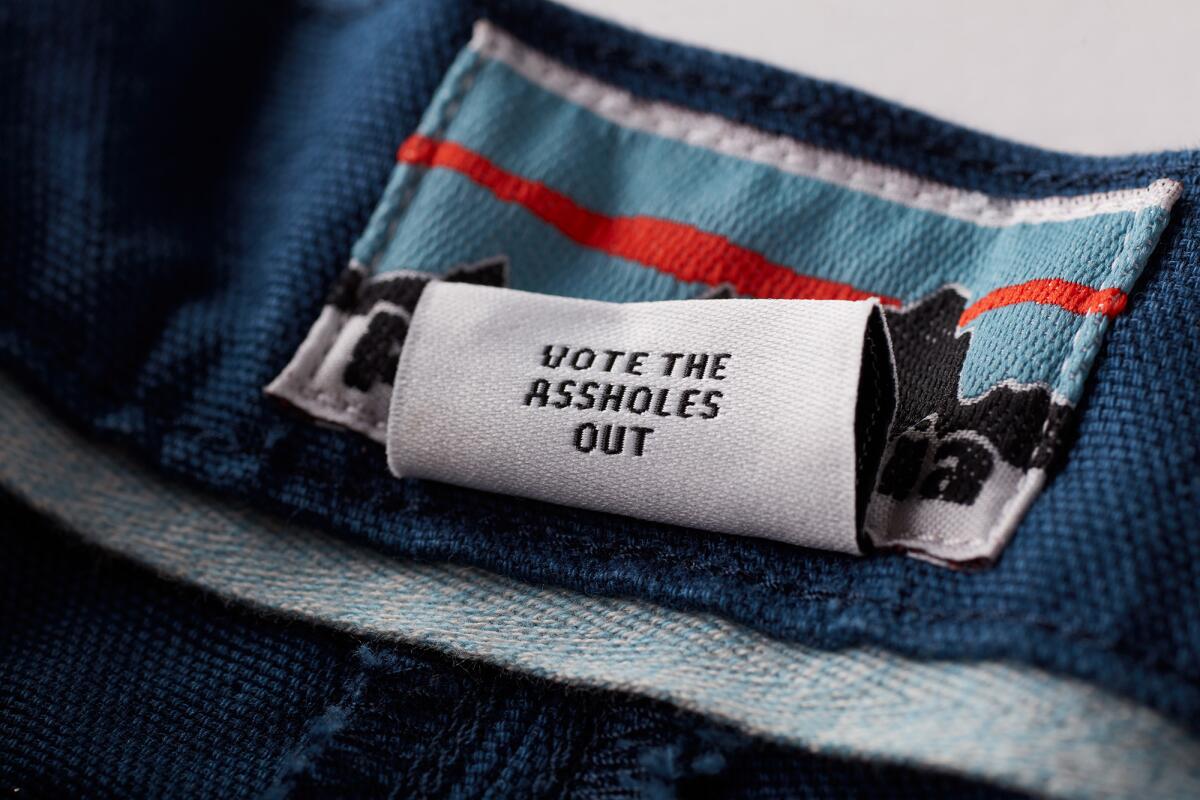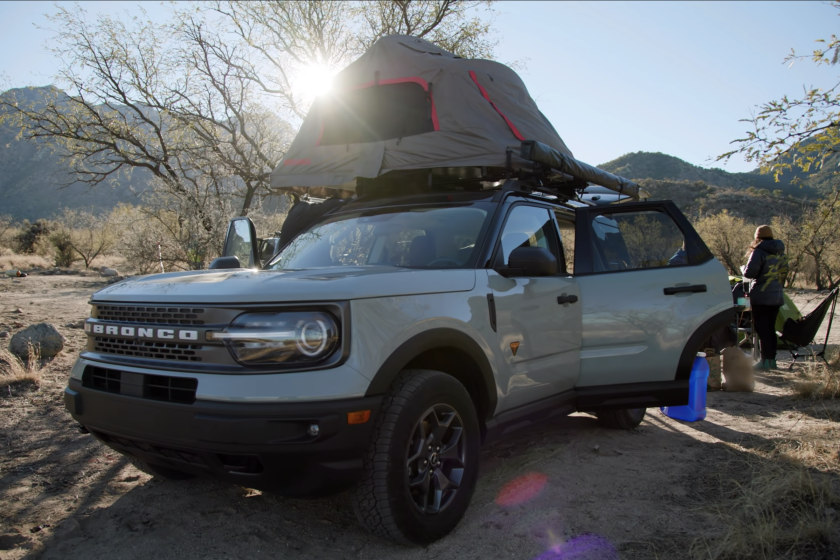Patagonia shows corporate activism is simpler than it looks

In 1990, Patagonia made a donation to Planned Parenthood, angering Christian fundamentalists. The response was swift: calls for a boycott, threats of store pickets and a deluge of complaints to its call center that jammed its phone lines.
The Ventura-based outdoor apparel retailer could have tried to placate the protesters. Instead, the company directed customer service representatives to respond: “Thank you so much for sharing your views. We want you to know that for every call like this we receive, we’re donating an additional $5 to Planned Parenthood.”
“The calls stopped pretty soon,” recalled Vincent Stanley, Patagonia’s director of philosophy.
And the sales, as usual, kept chugging along.
Politics has always been a minefield for businesses. But it used to be one they could avoid.
Three decades ago, it was all but unheard of for a major consumer brand to stake out a position on a hot-button culture war issue. Today, they’re increasingly finding such positions thrust on them by societal upheavals too big to simply ignore and activist customer bases demanding expressions of solidarity and meaningful action.
The rise of “conscious capitalism” has bred in younger consumers, particularly, an expectation that the companies seeking their dollars should share their values. Meanwhile, the hyper-partisan polarization of everything from sneakers to coffee means even “safe” causes can turn controversial in an instant, and silence is no refuge, with companies that avoid engaging on social issues apt to be tagged as complicit.
It’s all a little daunting for companies hoping to make sales, not headlines.
“The problem right now is you have businesses that are afraid,” said Marc Elias, a voting rights lawyer who works with Patagonia and other companies on their activism efforts. The instinct of most corporate leaders is to seek safety by staying with the herd and issuing only the blandest possible statements, he said. “It’s really unfortunate, because now is not the time for businesses to offer thoughts and prayers.”
The history of Patagonia suggests such risk aversion is unnecessary, if not outright counterproductive. The company has managed to pull off a high-wire act mixing business with activism throughout its 48-year history, its core business selling outdoor clothing seemingly bolstered by its progressive attitude and, at times, antics.
The retailer figured out a key lesson early: For all the corporate hand-wringing about losing customers, boycott threats are often limited to just that. If you make products that consumers want to buy, your brand can function as a political platform with little risk to the bottom line, brand strategists say. Even the free publicity of a backlash can be advantageous.
“People often ask, ‘Are you a for-profit business or are you an NGO?’” Patagonia Chief Executive Ryan Gellert said. “And the answer in my mind is yes; I think we’re some weird mashup of those two things. What we really are is a for-profit business, and we use the business to try to influence larger, more systemic issues.”
Boycotts, he said, are “just not something we think about.”
A cheeky hidden message is the company’s latest call to action on climate change and protecting public lands.
In the past, Patagonia’s advocacy was primarily focused on environmental causes. In 1985, it began donating 10% of its profit to conservation groups, which it later changed to 1% of all revenue. It sued President Trump after he announced plans to shrink national monuments in Utah. To discourage unnecessary consumerism, it has run ads asking people not to buy its products and is scaling back its lucrative business selling third-party logo gear to corporate clients (a move widely interpreted as Patagonia trying to distance itself from the banking and tech firms that love to slap their names on its fleece vests and puffy jackets).
But in a supercharged political environment, Patagonia has widened its scope. It pulled its ads off Facebook last year, citing the social media giant’s “spread of hateful lies and dangerous propaganda.” That was followed by a “Vote the Assholes Out” tag sewn into a line of men’s and women’s shorts ahead of the presidential election. A few weeks ago, the company donated $1 million to fight restrictive voting laws in Georgia.
The donation — along with an open letter by Gellert in which he pushed other CEOs to step up and “do more than make a corporate statement” — riled conservatives. Some called for a boycott on Twitter and told the retailer to stay out of politics. “You’ve decided to get woke so now you can go broke. So I guess it’s #boycottpatagonia time,” read one tweet.
Going broke doesn’t appear to be much of a risk at the moment. Executives at Patagonia, which is privately held with reported revenue of more than $1 billion annually, say there has never been a material sales decline when it has dabbled in contentious issues. It operates 36 stores in 19 states and Washington, D.C., and sells its products at more than 2,000 retailers worldwide.
“It’s worth losing a few customers — we always gain more when we take one of these positions,” spokesperson Corley Kenna said. Plus, a tweet pledging to boycott doesn’t automatically equal a lost sale: “Everyone says they’re a customer, but the truth is, if we had all of those customers, we’d be a lot bigger.”
Smoke without fire
Undeniably, straying from strictly business into politics carries a risk of negative attention. Republicans have been calling for boycotts of several major corporations that opposed the new Georgia voting laws, among them Coca-Cola and Delta Air Lines. In years past, Chick-fil-A and Keurig faced scrutiny for espousing controversial stances through their donations or ad spending.
But whether the noisiness of the outcry corresponds to any economic activity is much less clear. Nike, one of the world’s most recognizable brands, was excoriated by conservatives three years ago when it released an ad featuring former NFL quarterback Colin Kaepernick, who helped start a movement of players kneeling during the national anthem to protest police brutality and racial injustice. “Believe in something. Even if it means sacrificing everything,” the caption read.
Despite the backlash, which included social media users posting photos of their Nike merchandise burning in trash cans, the company blew through sales projections during the quarter the campaign was released, with revenue increasing 10% to $9.4 billion.
“Over time, boycotts have not been an effective advocacy tool,” said Doug Hattaway, who works with businesses and nonprofits on their branding and advocacy strategies. Thinking otherwise may be “paying too much attention to the Twitterverse. … Companies should not fall into that.”
He said Patagonia has benefited from firm messaging over a long period, high-quality products with cachet, a loyal fan base and an unbending belief that what it’s doing is right. Those are especially important, brand strategists say, at a time when it’s difficult to discern which brands are merely saying what they think will help them keep or attract customers.
“We don’t take the stances that we take trying to monetize them; we’re also conversely not fearful of the outcomes on the business,” Gellert, the CEO, said. “The people that have a deep relationship with Patagonia understand who we are, what we stand for, and I think do appreciate that we’re willing to put our money, our voice, our name, our reputation on the line.”
Time and again, shooting from the political hip has paid off for Patagonia. Its “Vote the Assholes Out” labels were conceived and carried out by the company’s designers without the involvement of the leadership team; they sold out quickly.
Another snap decision was a promotion on Black Friday in 2016, shortly after Trump was elected, in which the company announced it would donate 100% of sales that day to grass-roots environmental groups.
“Ordinarily, we would have done about $2.5 million worldwide,” Stanley, the director of philosophy, said of typical day-after-Thanksgiving revenue. But that day, “we did $10 million — and about a third of the customers were new. So I think that if you define your values and you practice them consistently, which we have over time, I do think we’re making more friends than we’re losing by the stances we take.”
It’s a formula that Ben & Jerry’s has also employed to good effect. The two brands regularly share insights with each other as they’ve increased their advocacy work, said Chris Miller, the ice cream company’s head of global activism strategy.
“In order to get it right, root it in something real. Don’t try to appropriate a value that you think your consumers have,” he said. “Trying to thread a mushy middle and create something that’s inoffensive to everyone is a recipe for disaster. That’s how you really get it wrong.”
REI says climate change is an existential threat. But it’s helping Ford market the Bronco Sport.
Like Patagonia, Ben & Jerry’s has put a cheeky twist on do-gooderism. In 2009, it temporarily changed the name of its Chubby Hubby ice cream to Hubby Hubby, along with a label featuring two men in tuxedos, to honor marriage equality in Vermont. It released a Pecan Resist flavor in 2018 in the run-up to the midterm elections and, a year later, a Justice ReMix’d flavor.
“The primary impact is it generates some calls,” Miller said. “This business has grown year over year for 43 years. I have no data to show you that when we take a position that that in any way hurts the business. It doesn’t mean that someone doesn’t walk into a scoop shop and say something insulting to a scooper. That has happened.”
Gellert, too, acknowledged that Patagonia hears more criticism than it used to.
“That’s a function of two things: one is this polarized environment. No. 2: social media,” he said. “There are more ways to communicate; there are more ways for people to share their opinions.”
But even those angry social media users who are genuine customers are unlikely to withhold their business over it. According to market research firm Global Web Index, only 1 in 3 people said they would commit to boycotting brands they feel are not socially responsible.
The new advocacy
On the rare instances when Patagonia has taken actions that didn’t jibe easily with its reputation for upholding progressive principles, it hasn’t generated much heat. The company’s Lost Arrow Project, which produces tactical outerwear and protective equipment for the U.S. military on a contract basis, has attracted only desultory criticism.
“I wish Patagonia didn’t contribute to the military industrial complex,” wrote one commenter on a Reddit thread, while a National Review article last fall noted: “Some of Patagonia’s more stridently liberal customers, who see the U.S. military as an inherently imperialistic or destructive force, might not see the company’s military contracts as a sin that they can excuse or forgive.”
Patagonia executives dismissed the notion of a contradiction and downplayed Lost Arrow Project’s significance.
“The size of that business is a rounding error in the totality of what we do,” Gellert said. “But yeah, that is a piece of our footprint.”
Another outdoor brand, Trek Bicycle, was faced with boycott threats last year over its contracts to supply police departments. After the police killing of George Floyd, officers at several Black Lives Matter rallies were captured on video using their bikes to batter protesters.
Although Trek responded by saying that it was committed to addressing systemic racism and that its bikes had been “used by police in ways that are abhorrent,” it didn’t commit to winding down its police business: “We believe bikes can play a positive role by continuing to get officers out of cars and armoured trucks and into the community where trust can be built.” Still, a year later (helped by the pandemic), Trek sales are up hugely, with the company saying on its website that it is “building twice as many now as we did in the previous year.” (Trek did not return a call for comment.)
Rather than worry about potential boycotts, Patagonia’s executives are wrestling with the question of when to get involved, Kenna, the spokesperson, said.
“We live in a world of overlapping crises and everything is intersecting, so it opens the door of, OK, are we speaking out on all these issues? We haven’t figured that out perfectly,” she said. “For a long time, we did look at the world as siloed problems, but they’re not siloed. That’s part of the new advocacy. It really makes how companies communicate on these topics more complicated.”
Skeptics have pointed to the rise in corporate activism as nothing more than virtue signaling, which Gellert said he accepted as fair criticism.
“People are right to be cynical about the intentions of business, period, and if you want to be cynical about the intentions of our business, that’s fine — that’s probably a healthy, natural posture to start with,” he said. “I accept that people will try to create a narrative that’s inaccurate. But we’re going to continue to show up and engage.”








